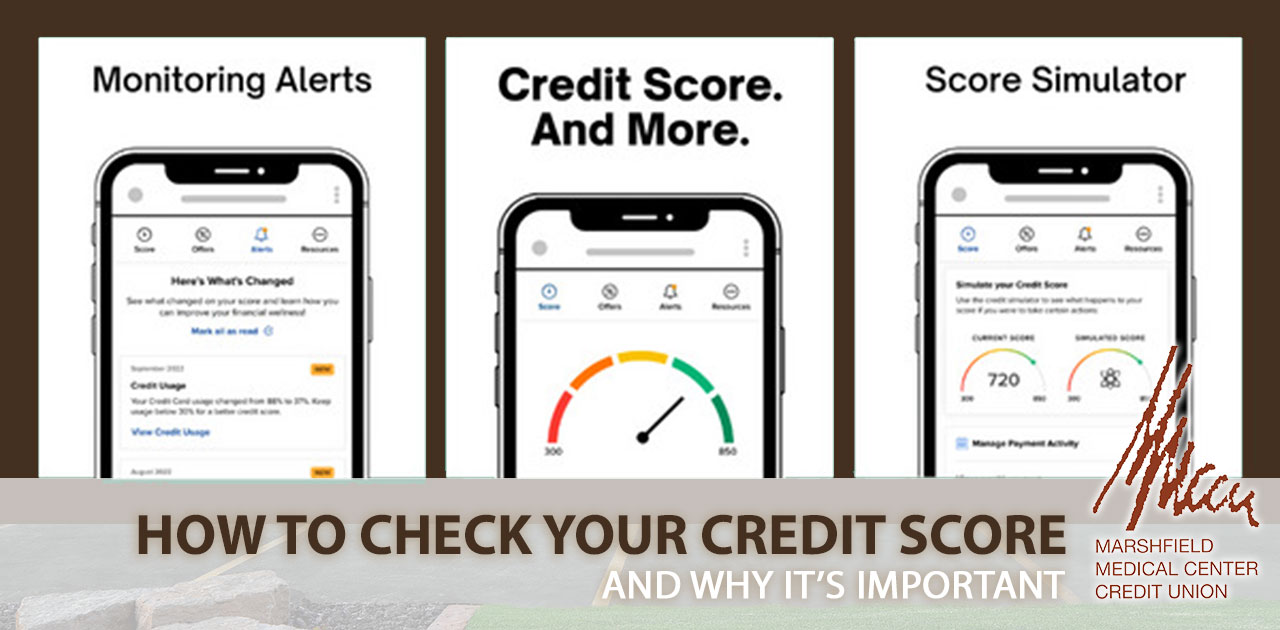A credit score is a numerical representation of an individual’s creditworthiness, which is based on their credit history and financial behavior. It is a three-digit number that helps lenders, such as banks, credit card companies, and other financial institutions, assess the risk of lending money to a particular person.
Credit scores are typically calculated using information from the person’s credit report, which is compiled by credit bureaus based on data provided by creditors and other sources. The most commonly used credit scoring models are developed by companies like FICO (Fair Isaac Corporation) and VantageScore.
MMCCU members can check their credit score through the online banking portal here.
What Impacts a Credit Score
The factors that contribute to a credit score may vary slightly between different credit scoring models, but some of the common elements considered include:
- Payment History: The most significant factor in determining a credit score is the individual’s history of making timely payments on credit accounts like credit cards, loans, and mortgages. Consistent, on-time payments positively impact the credit score, while late or missed payments can have a negative effect.
- Credit Utilization: This refers to the amount of credit an individual is using compared to their total credit limit. A lower credit utilization ratio (using a smaller percentage of available credit) generally leads to a higher credit score.
- Length of Credit History: The length of time an individual has had credit accounts is also a factor. A longer credit history provides more data for lenders to assess the borrower’s reliability.
- Credit Mix: A diverse mix of credit types, such as credit cards, installment loans, and mortgages, can positively influence a credit score, as it demonstrates responsible management of different types of credit.
- New Credit Applications: Opening multiple new credit accounts in a short period can be seen as risky behavior and may temporarily lower a credit score.
- Negative Information: Records of late payments, defaults, bankruptcies, and other negative events on credit reports can significantly lower credit scores.
Credit scores typically range from around 300 to 850, with higher scores indicating lower credit risk and better creditworthiness. A higher credit score makes it easier to qualify for loans and credit cards with favorable terms, such as lower interest rates and higher credit limits.
It’s important to regularly check your credit score, understand its implications, and work towards maintaining a positive credit history to improve your overall financial health.
Checking your credit score is important for several reasons:
- Financial Awareness: Your credit score is a numerical representation of your creditworthiness. It gives you a clear picture of how lenders view your credit history. By regularly checking your credit score, you can stay informed about your financial standing and be aware of any potential issues or inaccuracies.
- Loan and Credit Card Applications: When you apply for a loan or a credit card, lenders use your credit score as one of the key factors in determining whether to approve your application and what interest rate to offer. A higher credit score generally results in better loan terms and lower interest rates, which can save you money over time.
- Identifying Errors and Fraud: Credit reports may sometimes contain errors or inaccurate information. These errors could negatively impact your credit score and, in turn, affect your ability to get approved for loans or credit cards. Checking your credit score allows you to spot these errors and take corrective action promptly.
- Building and Maintaining Good Credit: To improve your creditworthiness, you need to understand where you currently stand. Regularly monitoring your credit score enables you to track your progress in building and maintaining good credit over time.
- Early Warning for Identity Theft: Identity theft is a significant concern in today’s digital world. By monitoring your credit score, you can detect any suspicious activity that may indicate potential identity theft or fraud. Catching these issues early can prevent further damage to your credit and finances.
- Negotiating Power: When you’re aware of your credit score, you have a better understanding of what loan or credit card terms you might qualify for. This knowledge can give you more negotiating power when discussing interest rates and other loan terms with lenders.
- Personal Finance Improvement: Regularly checking your credit score can motivate you to improve your financial habits. It encourages responsible credit usage, timely bill payments, and overall better money management practices.
- Preparing for Major Financial Decisions: If you plan to make significant financial decisions, such as buying a house or a car, having a good credit score is essential. By monitoring your credit score, you can take steps to improve it before making these big purchases.
How to Check Your Credit Score as an MMCCU Member
As an MMCCU member, you have the capability of checking your credit score through the online banking system. We recommend this as a way to continually monitor your credit – without it impacting your credit in any way.
Other tools to check your credit score include:
- Obtain a Free Credit Report: Under the Fair Credit Reporting Act (FCRA), you are entitled to a free credit report from each of the three major credit bureaus (Equifax, Experian, and TransUnion) once every 12 months. You can request your free credit reports by visiting AnnualCreditReport.com. This website is the only authorized source for free credit reports, as mandated by federal law.
- Choose a Credit Monitoring Service: There are numerous websites and services that offer credit monitoring and credit scores. Some of these services provide free credit scores, while others may require a subscription or charge a fee for access to additional features. Make sure to research the service’s reputation and any associated costs before signing up.
- Credit Score Apps: Several mobile apps are available that allow you to check your credit score for free. These apps often provide additional features like credit monitoring, alerts, and personalized tips to improve your credit score.
- Credit Bureaus’ Websites: Some credit bureaus offer their own credit score monitoring services. You may be able to access your credit score directly from their websites for a fee or as part of a trial period.
Remember to be cautious while providing your personal information online and ensure that you are using reputable sources to check your credit score. Regularly monitoring your credit score can help you stay on top of your financial health, detect potential errors or fraud, and work towards improving your creditworthiness.


